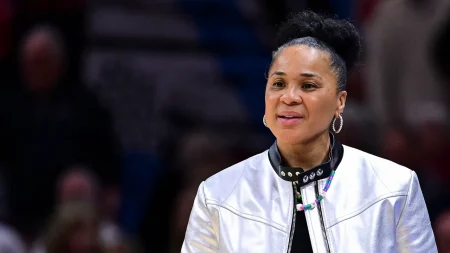The LPGA Tour has recently announced a significant update to its gender-eligibility policy, which will come into effect at the beginning of the 2025 season. In this new policy, male players who have experienced male puberty will be prohibited from competing in all LPGA-sanctioned events, including the LPGA Tour, the Epson Tour, the Ladies European Tour, and various elite LPGA competitions. This decision was made after consultations and calls for change from both current and retired professional golfers, aiming to ensure that the integrity of women’s competitions is maintained. The announcement highlights the LPGA’s ongoing commitment to inclusivity while defining clear eligibility requirements for its competitive events.
At the heart of this policy change is the classification of competitions within the LPGA. The organization delineates events as either “women’s events,” which enforce stringent eligibility criteria, or “open events,” where players are allowed to compete regardless of sex. This framework aims to create a space where both gender-specific and gender-inclusive competitions can coexist, allowing for a diverse range of athletes to participate at various levels. By establishing these categories, the LPGA seeks to encourage wider participation while respecting the competitive dynamics of women’s professional sports.
Outgoing LPGA Commissioner Mollie Marcoux Samaan emphasized that the policy change is grounded in scientific research and analysis. According to Marcoux Samaan, their approach reflects a commitment to fairness and competitive equity within elite competitions, as well as an intention to create an inviting environment for all participants. The LPGA recognizes the need to strike a balance between inclusivity and maintaining the integrity of women’s professional golf, which has historically been shaped by distinct biological factors.
This significant policy revision comes in the context of a broader conversation around gender equality and inclusion in sports, especially concerning transgender athletes and their participation in women’s competitions. The LPGA’s decision aligns with ongoing discussions in various sports about how to create equitable environments for athletes of all gender identities while ensuring fair play. It sheds light on the complexities of gender and competition and reframes the conversation toward scientifically informed policies that prioritize fairness in athletics.
The new eligibility criteria introduces clear boundaries that focus on biological factors related to puberty, reiterating that players assigned male at birth who have undergone male puberty are not eligible for LPGA events. This decision may lead to debates about inclusivity versus the integrity of women’s sports, as it raises questions about how organizations can accommodate diverse identities while still ensuring a level playing field. The policy’s foundation in scientific principles is designed to mitigate potential backlash and enhance acceptance among players and stakeholders.
Overall, the LPGA Tour’s updated gender-eligibility policy represents a significant step in addressing the complexities of gender identity in professional sports. By clearly outlining eligibility requirements and grounding its policy in scientific rationale, the LPGA aims to foster a competitive yet inclusive environment. As the LPGA strives to enhance its community’s spirit while prioritizing fairness, it sets a precedent for other sports organizations grappling with similar challenges in the evolving landscape of competitive athletics.










